 |
|
Alfa-linoleenzuur-diacylglycerol zet de vetverbranding een tandje hoger
Suppletie met een paar gram alfa-linoleenzuur-diacylglycerol laat menselijke proefpersonen in een periode van twee weken een afgeknepen half kilootje lichaamsvet verliezen. Dat blijkt uit een kleine trial die onderzoekers van de Japanse Kao Corporation in 2016 publiceerden in de Journal of Oleo Science. Stop dat spul samen met allulose, voedingsvezels als inuline en heel veel eiwit in een reep, en je hebt een dieetproduct dat de concurrentie doet verschieten van kleur. Kan niet anders.
Diacylglyceride versus triglyceriden
Een vet is een bolletje [glycerol] met 3 slierten eraan [de vetzuren]. Daarom heten vetten ook wel triglyceriden. Onderzoekers van de Japanse Kao Corporation experimenteren al jarenlang met een alternatief voor vet: bolletjes met niet 3, maar 2 sliertjes. Diacylglyceriden, heten die dingen. Zeker als die sliertjes omega-3-vetzuren zijn, hebben diacylglyceriden interessante eigenschappen.
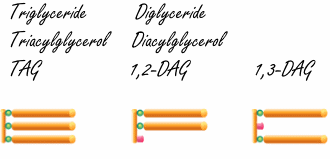
Studie
De Japanners lieten 16 proefpersonen gedurende 14 dagen een koekje eten waarin ze stiekem geen vet hadden gebruikt, maar 2.5 gram alfa-linoleenzuur-diacylglycerol. De precieze samenstelling zie je hier. Bij een andere gelegenheid kregen dezelfde proefpersonen 14 dagen achtereen elke dag een normaal koekje, waarin 2.5 gram raapzaadolie was verwerkt.
Resultaten
De onderzoekers gaven de proefpersonen aan het einde van beide suppletieperioden een maaltijd met gelabeld vet [13C], en bepaalden gedurende zes uur door analyse van hun uitgeademde koolstofatomen hoeveel vet ze verbrandden. Zo ontdekten de Japanners dat toediening van alfa-linoleenzuur-diacylglycerol [ALA-DAG] de vetverbranding verhoogde.
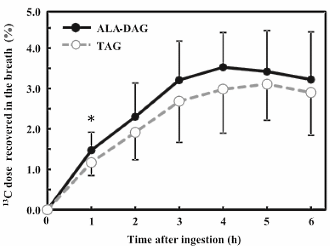
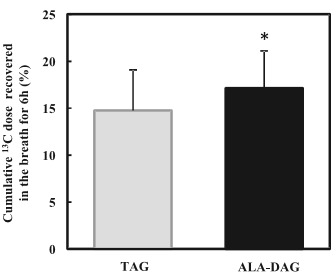
Nadat ze 14 dagen alfa-linoleenzuur-diacylglycerol hadden binnengekregen waren de proefpersonen 400 gram lichaamsvet lichter dan na de periode waarin ze raapzaadolie hadden geconsumeerd.
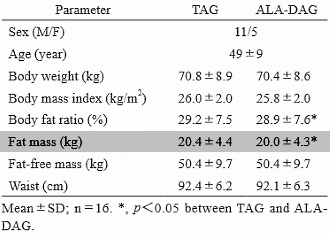
Mechanisme
"Repeated consumption of alpha linolenic acid-enriched diacylglycerol enhances beta-oxidation in the small intestine [J Nutr. 2002 Oct;132(10):3018-22.] and liver [Biochim Biophys Acta. 2005 Apr 15;1733(2-3):224-31.] in rodents", schrijven de onderzoekers. "Although the precise mechanism by which alpha linolenic acid-enriched diacylglycerol consumption stimulates gene expression is not clear, it may be related to the metabolic pathway of alpha linolenic acid-enriched diacylglycerol."
"In general, the triacylglycerol structure is hydrolyzed by lipase to 2-monoacylglycerol and fatty acids and then resynthesized into triacylglycerol in the intestinal mucosa cells. In contrast, the diacylglycerol structure is hydrolyzed to 1- or 3-monoacylglycerol and fatty acids."
"Because 1-monoacylglycerol is not easily resynthesized to triacylglycerol in the small intestine [Lipids. 2005 Mar;40(3):281-6.] [Lipids. 2003 Jan;38(1):25-30.], the 1-monoacylglycerol and free fatty acids may remain in the intestinal mucosa cells after diacylglycerol consumption [Lipids. 2004 Sep;39(9):827-32.]."
"Omega 3 fatty acids, such as alpha linolenic acid, eicosapentaenoic acid, and docosahexaenoic acid increase the gene expressions including farnesoid X receptor and peroxisome proliferator-activated receptor compared to other fatty acids, such as saturated and omega 6 fatty acids [Am J Cardiol. 2006 Aug 21;98(4A):27i-33i.], suggesting that the free alpha linolenic acid derived from alpha linolenic acid-enriched diacylglycerol activates fat oxidation and suppress fat synthesis, particularly in the small intestine and the liver."

"Thus, diacylglycerol and alpha linolenic acid can synergistically affect fat oxidation. Indeed, Murase et al. suggested that beta-oxidation is higher in rodents fed alpha linolenic acid-enriched diacylglycerol than in those fed alpha linolenic acid-enriched triacylglycerol. [J Nutr. 2002 Oct;132(10):3018-22.] Additionally, alpha linolenic acid-enriched diacylglycerol can enhance fat oxidation at 25% of the dose compared to oleic and linolenic acid-riched diacylglycerol [Int J Obes (Lond). 2008 Dec;32(12):1841-7.]."
Conclusie
"Treatment with alpha linolenic acid-enriched diacylglycerol for 14 days enhanced the utilization of dietary fat as energy in healthy humans", concluderen de onderzoekers. "This result indicates that alpha linolenic acid-enriched diacylglycerol consumption has beneficial effects for preventing visceral obesity by upregulating dietary fat metabolism."
Bron:
J Oleo Sci. 2016 Aug 1;65(8):685-91.
Meer:
Fitter, gespierder en slanker door suppletie met visolie (10-1-2016)
Na een maaltijd met visolie verbrandt je lichaam meer kilocalorieën (4-2-2012)
Vetlagen op de romp krimpen door visoliecapsules (22-10-2008)
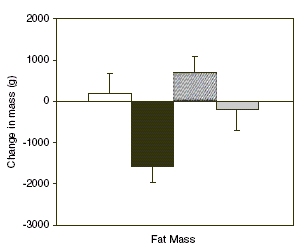 |
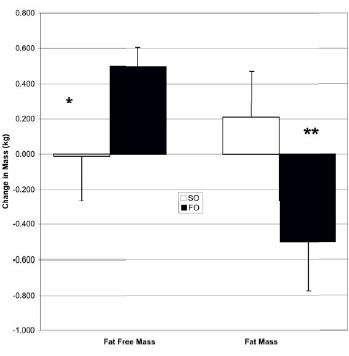 |
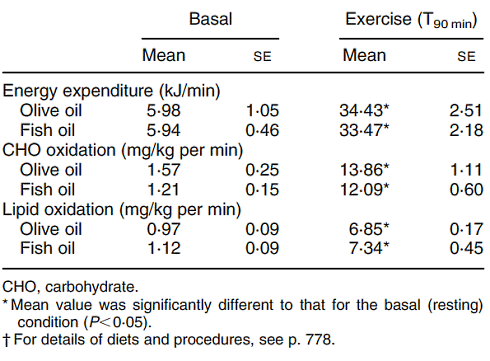 |
|
Visolie versterkt het effect van training op de vet- en de vetvrije massa in humane studie Proefpersonen waren obees. |
Zes weken visolie: een half kilootje vet minder vet, een half kilootje vetvrije massa erbij Als je niet bang bent voor doses die hoger zijn dan fabrikanten aanbevelen, dan kun je met een braaf supplement als visolie extra vet verliezen en extra spierweefsel opbouwen. Humaan onderzoek. |
Humane studie: vet verbranden gaat sneller met omega-3-vetzuren Volgens deze studie verbranden spieren tijdens inspanning meer vet en minder koolhydraten door suppletie met omega-3-vetzuren. |